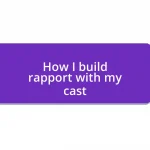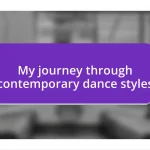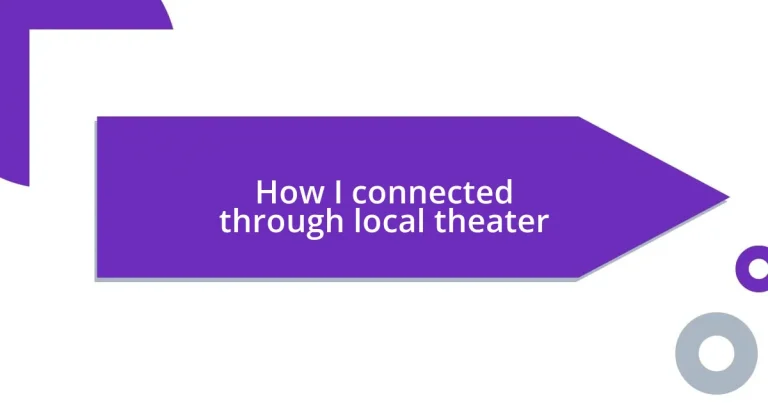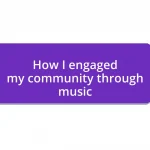Key takeaways:
- Local theater fosters community connections by giving voice to diverse stories, fostering empathy, and igniting conversations on important issues.
- Engaging in productions builds camaraderie, teamwork, and self-discovery among cast members through shared experiences and collaborative efforts.
- Audience engagement is vital, as their feedback can enhance performances and create a dynamic exchange that deepens the storytelling experience.
- Future involvement in local theater offers opportunities for personal growth, mentorship, and addressing community issues through artistic expressions.
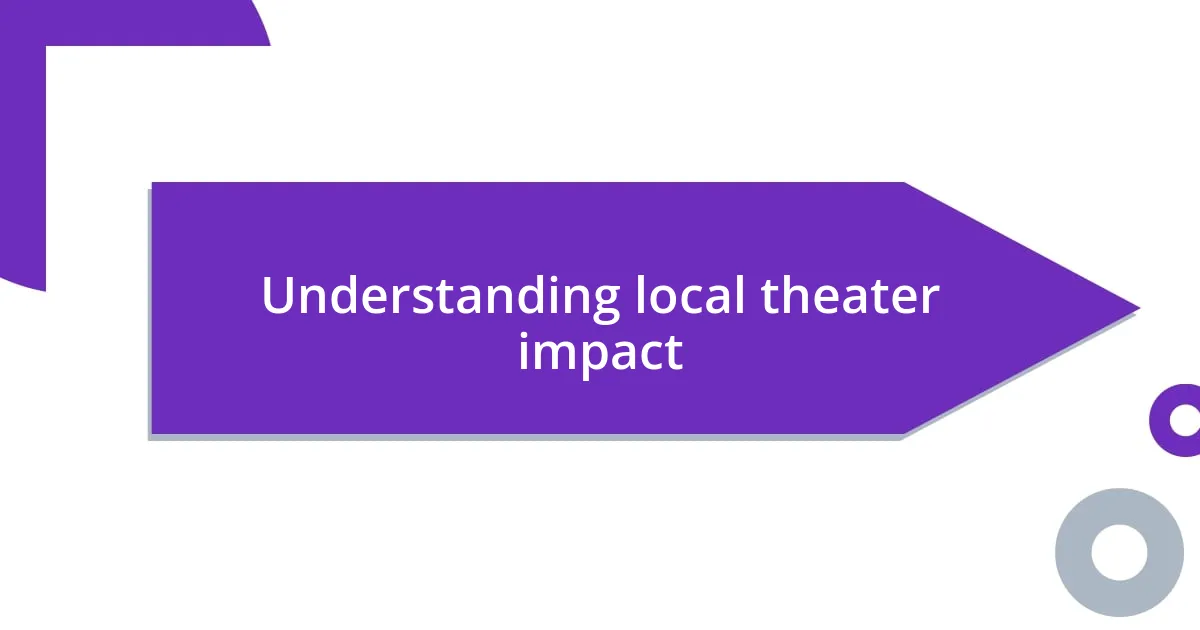
Understanding local theater impact
Local theater serves as a vibrant reflection of the community, offering a space where diverse stories come to life. I remember attending a local production that tackled the complexities of identity within our neighborhood. Watching those performers share their truths felt like they were giving voice to the unspoken experiences of many in the audience—connecting us all on a deeply emotional level.
It’s fascinating to think about how local theater can transform perceptions and build empathy. For instance, during one performance centered on social justice issues, I noticed people leaning forward in their seats, captivated by the raw honesty of the stories being told. Have you ever found yourself moved so profoundly by a performance that it lingered in your mind long after the curtain fell? Those shared moments can ignite conversations and foster understanding in ways that few other mediums can.
Moreover, the impact of local theater stretches beyond the stage. I’ve seen how it ignites passion and inspires creativity among community members, encouraging them to get involved, whether by acting, volunteering, or simply attending shows. It’s incredible to witness how a small theater can become a catalyst for change, nurturing talent and bringing people together to share their own narratives. Doesn’t it make you wonder what stories are just waiting to be discovered in your own community?
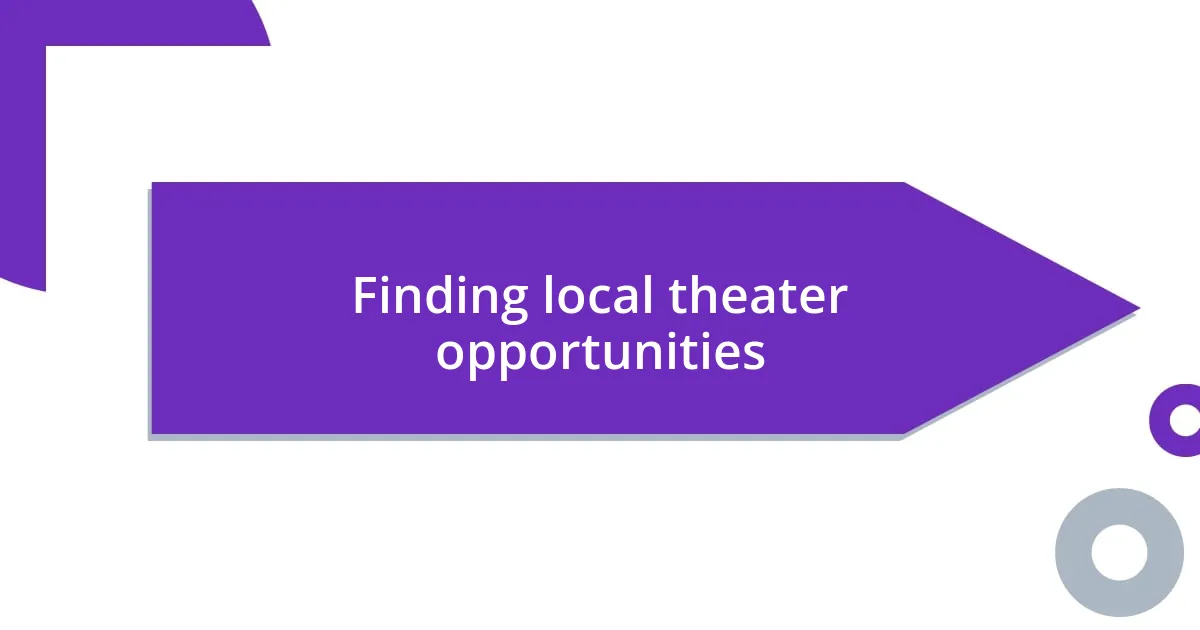
Finding local theater opportunities
Finding local theater opportunities can often feel like a hidden treasure hunt, but I’ve discovered that a little exploration goes a long way. I remember the first time I walked into my local community center and found a bulletin board filled with flyers for auditions, workshops, and performances. It was like stumbling upon a vibrant tapestry of possibilities waiting to be unraveled. If you keep an eye out for these community boards or utilize social media local groups, you’ll begin to see the myriad of opportunities offered right under your nose.
I also found that attending other productions can provide valuable networking opportunities. After a particularly engaging play, I struck up a conversation with someone in the audience who later introduced me to the director. I never would have guessed that a simple chat could lead me to join an upcoming ensemble. Just like that, local theater became a canvas for not only my creative expression but also meaningful relationships and collaborations.
Moreover, many local theaters host open auditions for various skill levels. I’ve participated in a few, and the atmosphere is usually so welcoming, fostering a sense of camaraderie among aspiring actors. I deeply value how it invites individuals from all walks of life to step forward, be it the shy newcomer or the seasoned performer looking to try something new. Every experience has its own magic, creating a rich tapestry of community connection rooted in shared passion.
| Opportunity Source | Description |
|---|---|
| Community Centers | Bulletin boards often list local auditions, workshops, and performances. |
| Social Media Groups | Platforms like Facebook can connect you with local theater communities and announcements. |
| Networking Events | Engage after performances to meet actors, directors, and fellow enthusiasts. |
| Open Auditions | Welcoming to all skill levels and a great way to immerse yourself in local productions. |
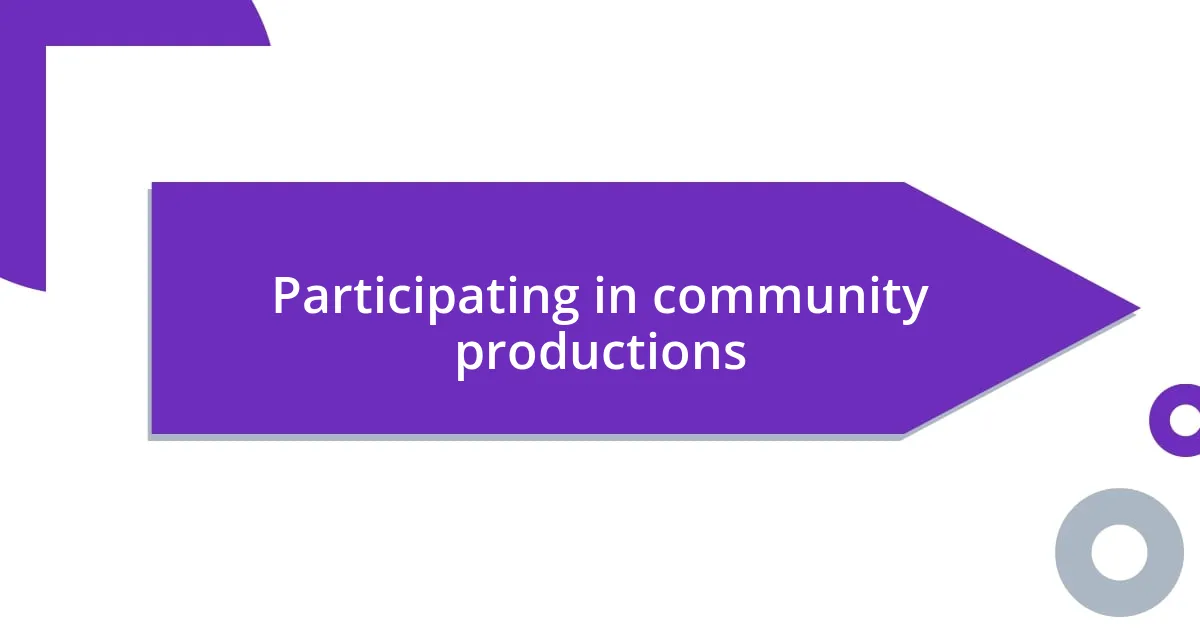
Participating in community productions
Participating in community productions can be an incredibly rewarding experience. Reflecting on my own involvement, I remember stepping onto the stage for the first time. The mix of excitement and nerves was palpable, yet as I engaged with my fellow cast members, that anxiety transformed into a sense of belonging. Each rehearsal became a safe space for creativity, where we shared laughter and challenged each other to push beyond our comfort zones. It struck me how quickly we went from strangers to a tightly-knit group, united by our passion for storytelling.
- The warmth of camaraderie among cast members creates lasting friendships.
- Collaborating on productions fosters teamwork and boosts confidence.
- Every role, big or small, plays a vital part in the shared goal of a successful performance.
- The thrill of a live audience amplifies the bond between the performers and the viewers.
- Experiences of laughter, tension, and triumph during set changes become cherished memories.
I recall one specific night when nerves got the best of me before an important performance. I was backstage, pacing and rehearsing my lines. A fellow cast member approached me, placed a reassuring hand on my shoulder, and said, “Remember, we’re all in this together.” That small gesture carried immense weight and reminded me that every person on that stage had my back. It’s moments like these that reinforce not just the joy of performing but the deep connections formed through our shared experiences in community theater. Engaging in productions opens doors to parts of ourselves we might not have discovered otherwise.
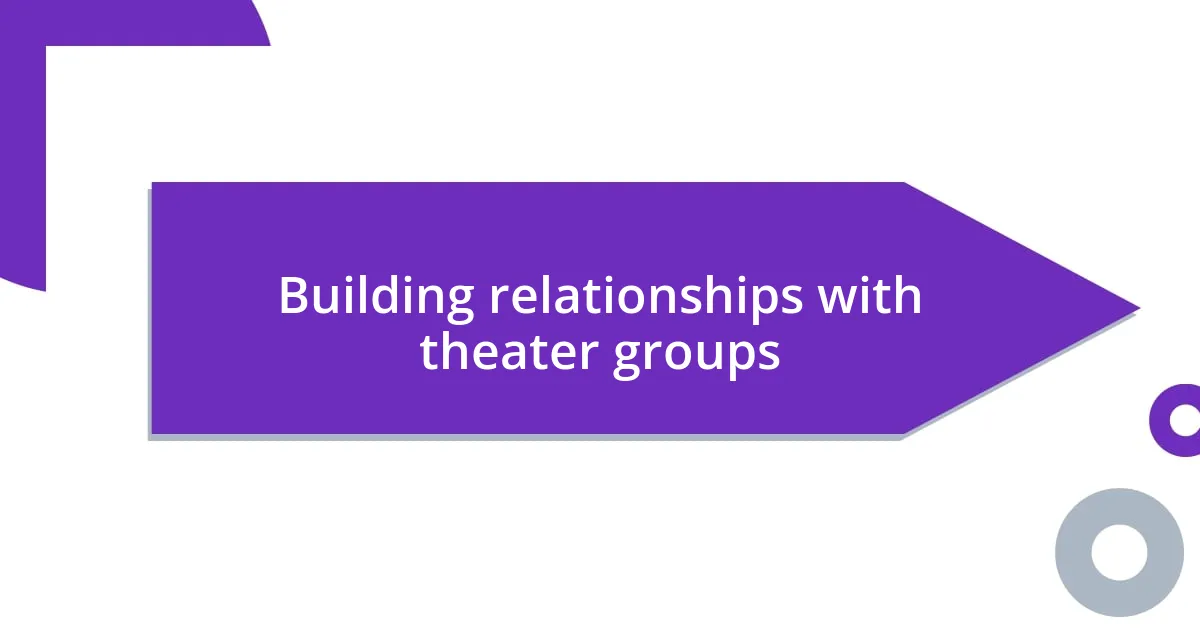
Building relationships with theater groups
Building strong relationships with local theater groups can be truly transformative. I remember volunteering for my first production, not knowing a soul. As I helped with set design, I was welcomed into a circle of passionate individuals. It was heartwarming to hear their stories and aspirations, and before I knew it, I had shared mine too. Isn’t it incredible how a shared interest in the arts can bridge gaps between total strangers?
Fostering relationships is not just about camaraderie; it’s about the shared experiences that bind us together. I often reflect on the late-night discussions we had after rehearsals, fueled by pizza and caffeine. We would dive deep into character development, trade ideas, and laugh about mishaps. Those conversations became more than creative collaborations; they were moments of vulnerability and growth. Have you ever found yourself sharing your dreams and fears with people who understand you on a different level?
In my journey, I’ve learned that maintaining connections is crucial for long-term involvement in theater. I actively joined follow-up events and social gatherings, and I made an effort to support friends in their solo projects. For example, attending a friend’s showcase was not merely a night out; it was a chance to reconnect, cheer each other on, and celebrate each other’s artistic journeys. Those relationships evolve into a valuable support network, essential for anyone passionate about the performing arts. How do you keep in touch with your theater connections? For me, it’s a blend of thoughtful gestures and shared experiences that keep the spark alive.
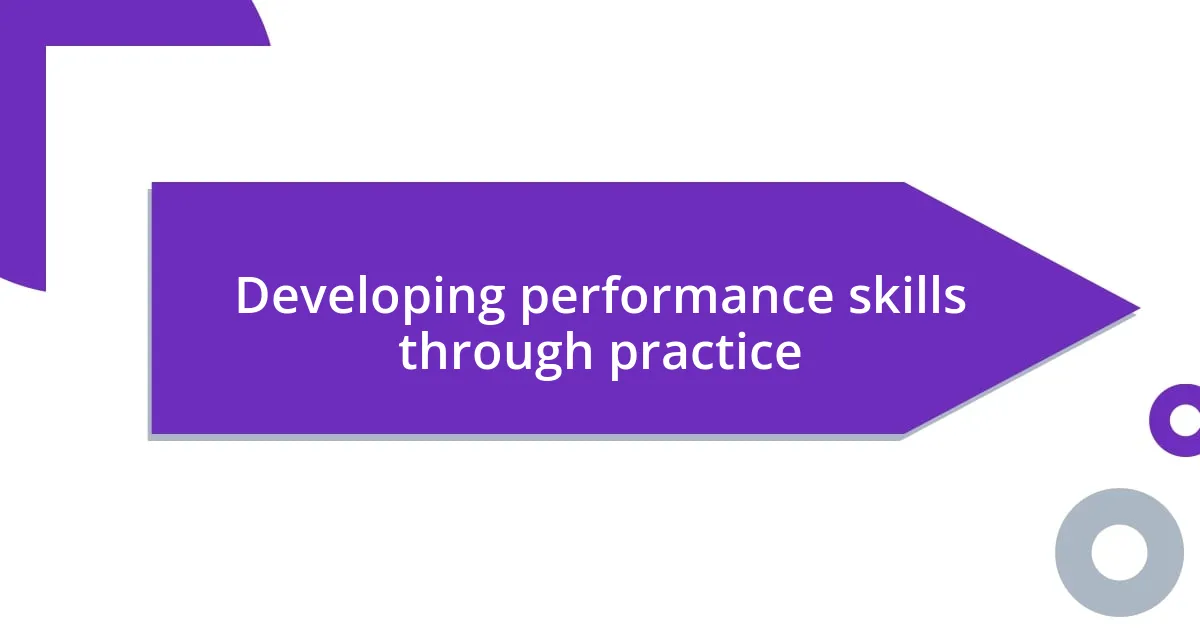
Developing performance skills through practice
Developing performance skills through practice is an intricate, personal journey. I distinctly remember a time during rehearsals when I was struggling with a particularly challenging scene. I kept flubbing my lines, feeling the pressure mounting. One evening, my director suggested we perform the scene in different styles—first as a tragedy, then a comedy. It was such a freeing experience! Not only did it help me find new layers to my character, but it taught me how versatile I could be on stage. Isn’t it amazing how stepping out of the traditional mold can spark creativity?
Some of my most profound learning moments occurred during those late-night rehearsal sessions. I’ll never forget when we tried a run-through without any blocking or direction. We were raw and unpolished, yet it became one of the most enlightening nights of my life. I realized how much my fellow actors and I contributed to one another’s performances. The emotional exchange was palpable, and I felt my confidence grow with every shared glance and reaction. Can you recall a time when improvisation opened up a new avenue for your own creativity?
Practice isn’t just about honing technical skills; it’s also about building emotional resilience. One remarkable night, we faced a mishap where a set piece collapsed. Instead of panicking, we all jumped in to support each other. Laughing through the chaos, I found that my instincts kicked in, allowing me to adapt on the spot. In those moments, I learned that performance is an elaborate dance of spontaneity and teamwork. How often do we discover our true capabilities when challenged unexpectedly?
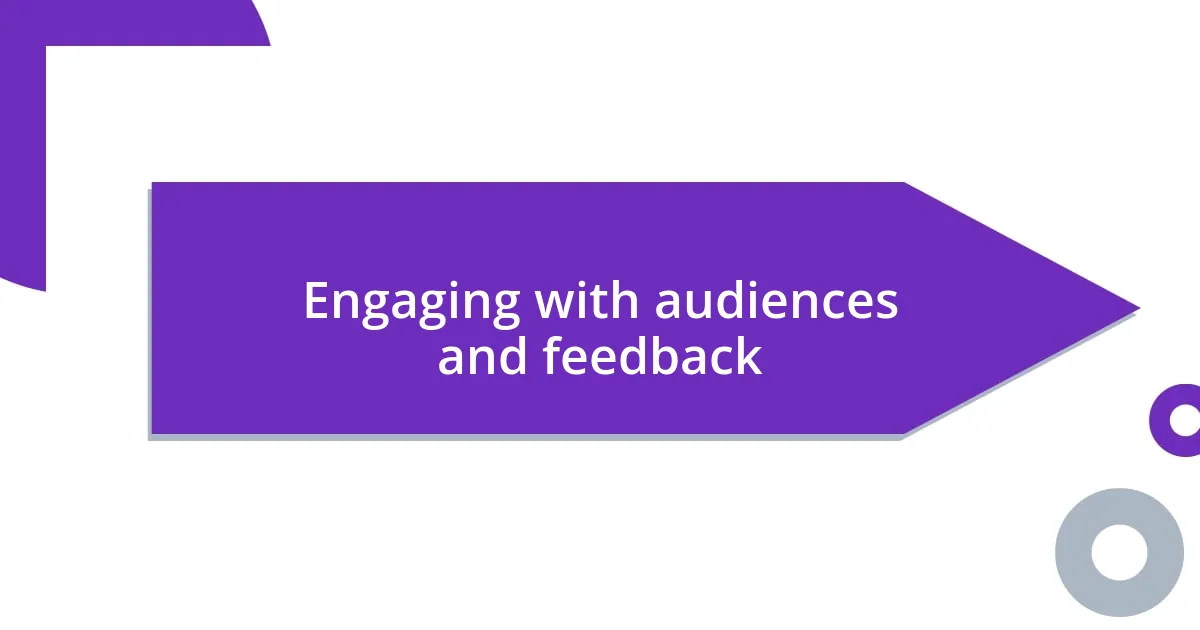
Engaging with audiences and feedback
Engaging with audiences is where the magic truly happens. One night, after a particularly gripping performance, I found myself surrounded by audience members eager to share their thoughts. Their enthusiasm was contagious, and I cherished hearing their interpretations and emotional responses. It’s a reminder that theater isn’t just for those on stage; it brings people together to reflect, connect, and even heal. Have you ever felt the impact of a performance linger long after the curtain falls?
Feedback can be a double-edged sword, but I’ve learned to embrace it as a vital part of growth. During a post-show talkback, I once received a piece of criticism that initially stung. However, listening to different perspectives opened my eyes to areas I hadn’t considered. The experience taught me that constructive feedback can illuminate blind spots and enhance our craft. Have you ever turned a critique into a stepping stone for your improvement?
The energy from the audience can shape a performance in ways I never anticipated. After one show, I noticed how a gentle applause after a heartfelt scene transformed my resolve, encouraging me to push deeper into my character’s emotions. It was as if we were in a dialogue together, their reactions flowing into my performance. In those moments, the connection felt tangible, reminding me how crucial the audience’s presence is to storytelling. When have you felt that dynamic exchange during a performance?
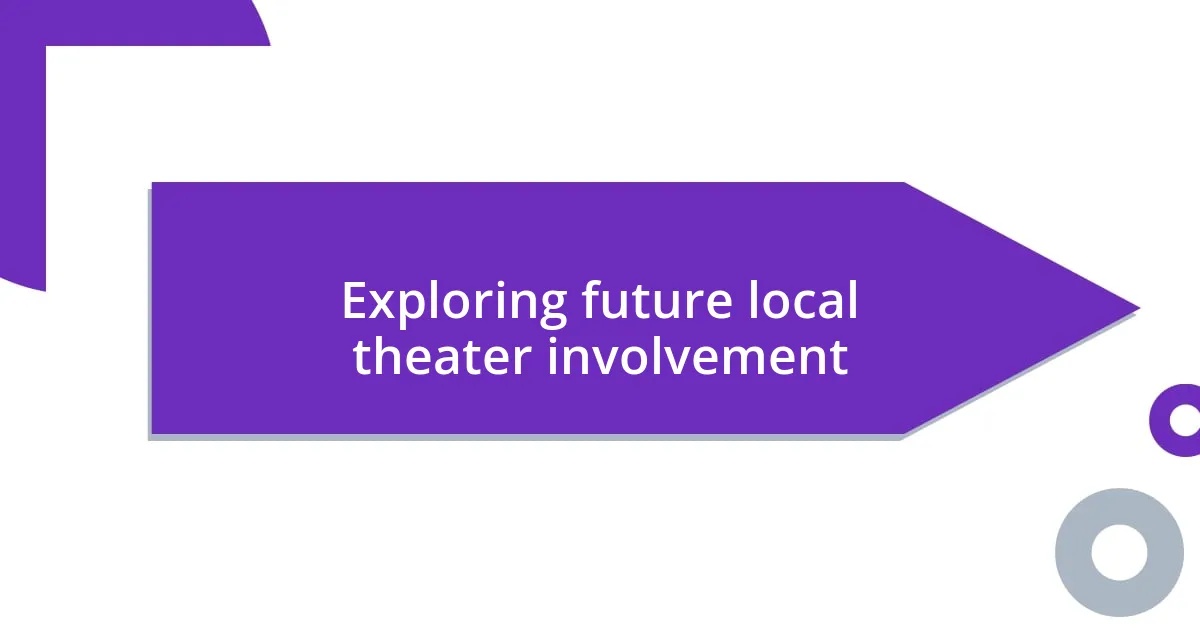
Exploring future local theater involvement
Exploring future involvement in local theater opens up a world of possibilities. I envision joining community workshops that focus on everything from acting to stage management, and all the hidden roles in between. Just imagine the friendships I could forge while learning valuable skills alongside people who share my passion. Wouldn’t it be exciting to collaborate on new productions?
I also see myself diving deeper into outreach initiatives, connecting local schools with theater programs. When I volunteered at a youth theater camp, I witnessed firsthand the joy in children’s eyes as they brought their characters to life. Seeing that spark ignited a desire in me to help nurture young talent. How rewarding would it be to mentor budding performers and illustrate the transformative power of theater?
Another avenue I’m eager to explore is community involvement through plays that reflect local issues. I recall a powerful production that tackled social justice themes — the conversations it sparked were invaluable. I want to take part in organizing similar events that not only entertain but also inspire change. Have you ever been a part of something that left a lasting impact beyond the stage? That’s the kind of engagement local theater can cultivate, and I’m excited to be part of that narrative.


